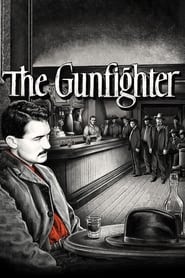The Assassination of Jimmy Ringo by the Coward Hunt Bromley (or: High 10:30am).
Really love the small moments that both give character and deepen the humanity of the secondary and tertiary players.
In The Gunfighter, a remarkable film of a couple of years ago, the landscape has virtually disappeared. Most of the action takes place indoors, in a cheerless saloon where a tired "bad man" (Gregory Peck)
contemplates the waste of his life, to be senselessly killed at the end by a vicious youngster setting off on the same futile path. The movie is done in cold, quiet tones of gray, and every object in it — faces, clothing, a table, the hero's heavy mustache — is given an air of uncompromising authenticity, suggesting those dim photographs of the nineteenth-century West in which Wyatt Earp, say, turns out to be a blank untidy figure posing awkwardly before some uninteresting building. […] The Gunfighter can permit us to feel that we are looking at a more "real" West than the one the movies have accustomed us to—harder, duller, less "romantic"—and yet without forcing us outside the boundaries which give the Western movie its validity.[…]
We come upon the hero of The Gunfighter at the end of a career in which he has never upheld justice and order, and has been at times,
apparently, an actual criminal; in this case, it is clear that the hero has
been wrong and the woman who has rejected his way of life has been
right. He is thus without any of the larger justifications, and knows himself a ruined man. There can be no question of his "redeeming" himself in any socially constructive way. He is too much the victim of his own reputation to turn marshal as one of his old friends has done, and he is not offered the sentimental solution of a chance to give up his life for some good end; the whole point is that he exists outside the field of social value.
— Robert Warshow: Movie Chronicle: The Westerner (1955)
[Plays] an intricate double game with genre expectations, satisfying some demands and implicitly chiding us for certain others. Significantly, the film’s first and final images are almost identical but register as antithetical in moral significance. After all, the callow silliness of boys skipping school so they can witness a hoped-for shootout — occasioned by the even sillier macho pretexts of adolescent males for beating still older gunfighters to the draw — is not so different from the spell exerted by most Westerns, which take this sort of behavior with utmost seriousness.
Governed by an almost Langian sense of fate, it's a film that has the true dimensions of tragedy.
— Anonmyous (TImeout)
To be sure, one might offer the opinion, in a solemn analysis of the full credibility of this picture, that the gunfighter might have stayed clear of trouble and consequent danger if he had merely kept out of bars.
— Bosley Crowther (The New York Times, 1950)
Like many postwar noirs, The Gunfighter is about a man who already knows he’s a ghost. [And] Ringo’s failure to look the part of the killer, which triggers much of the violence that occurs in The Gunfighter, mirrors how many of us expect our favorite athletes, actors, and singers to be more than mere people. The film understands such an expectation to be a dangerous kind of dehumanization.
— Chuck Bowen (Slant Magazine)

